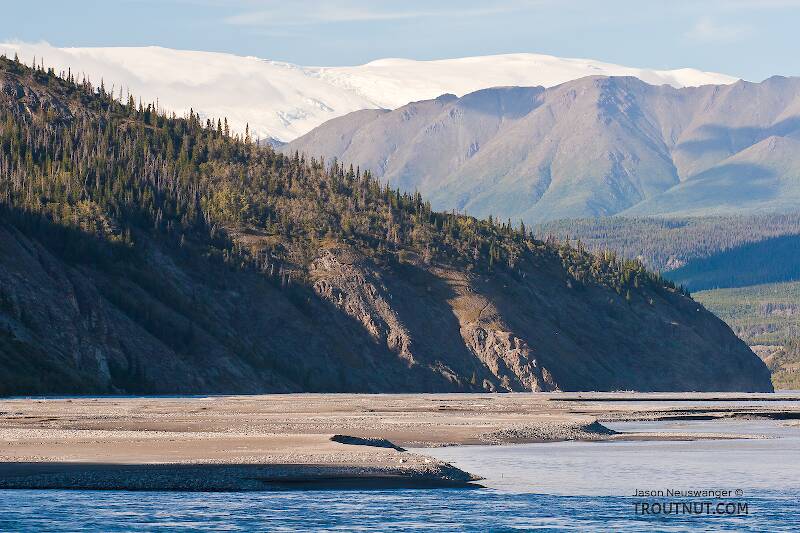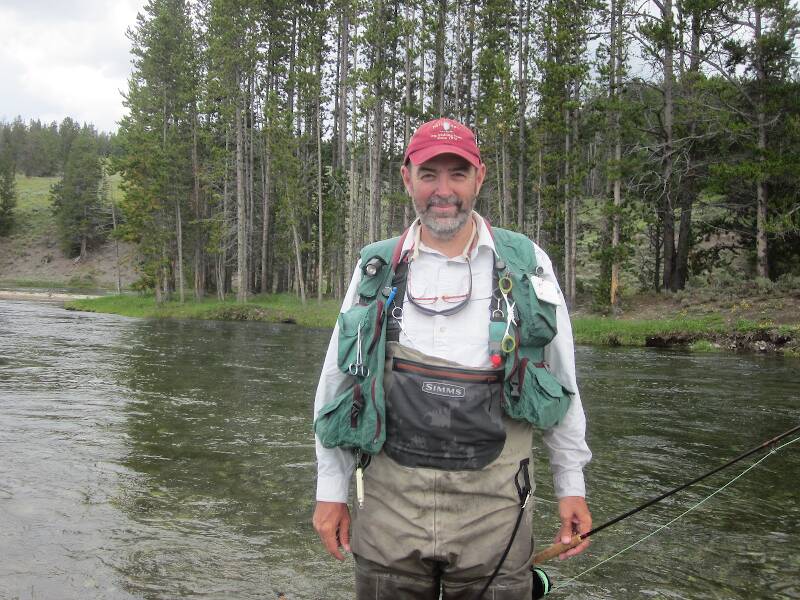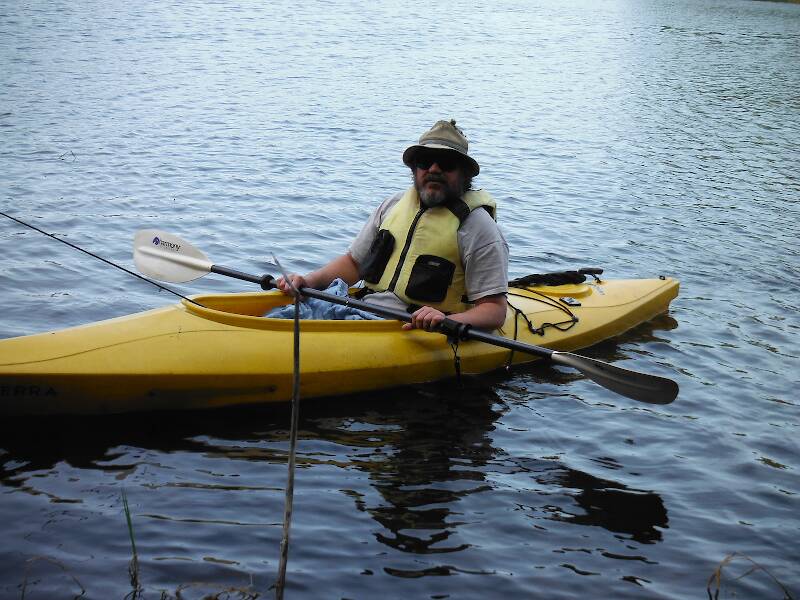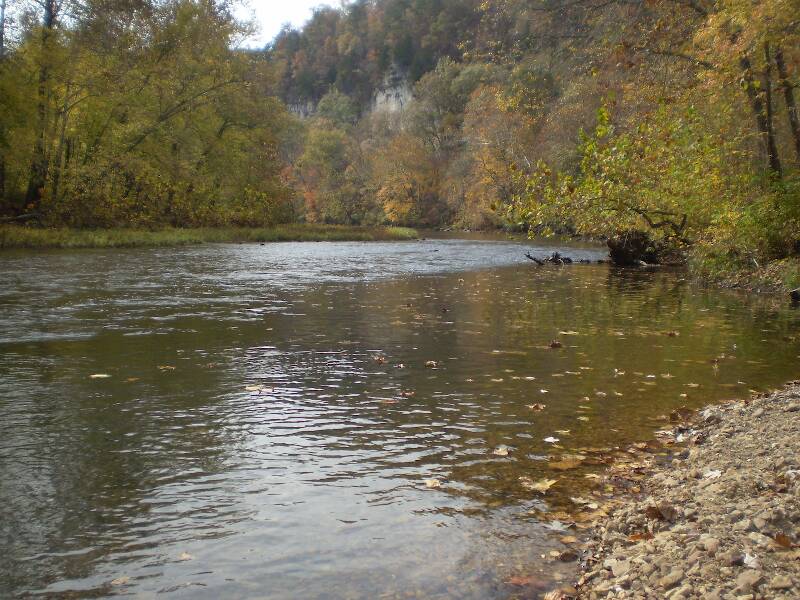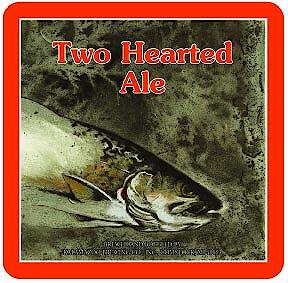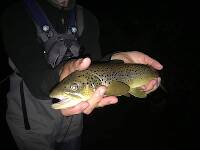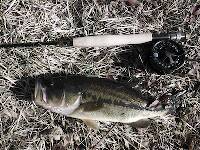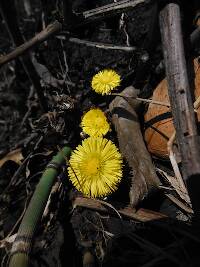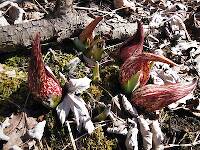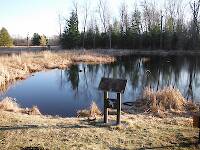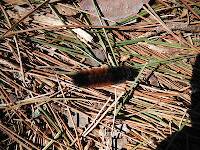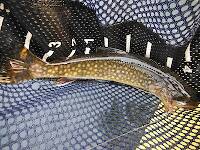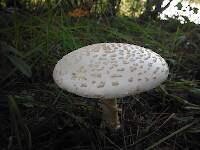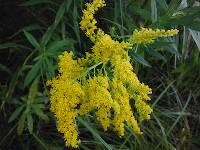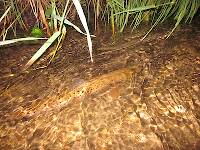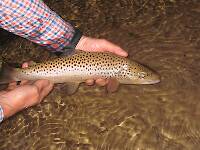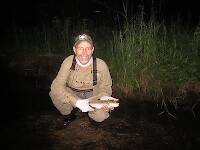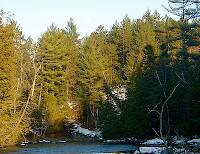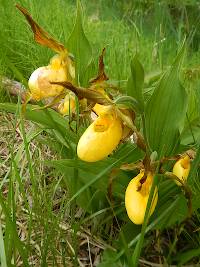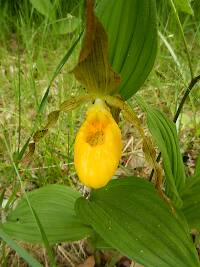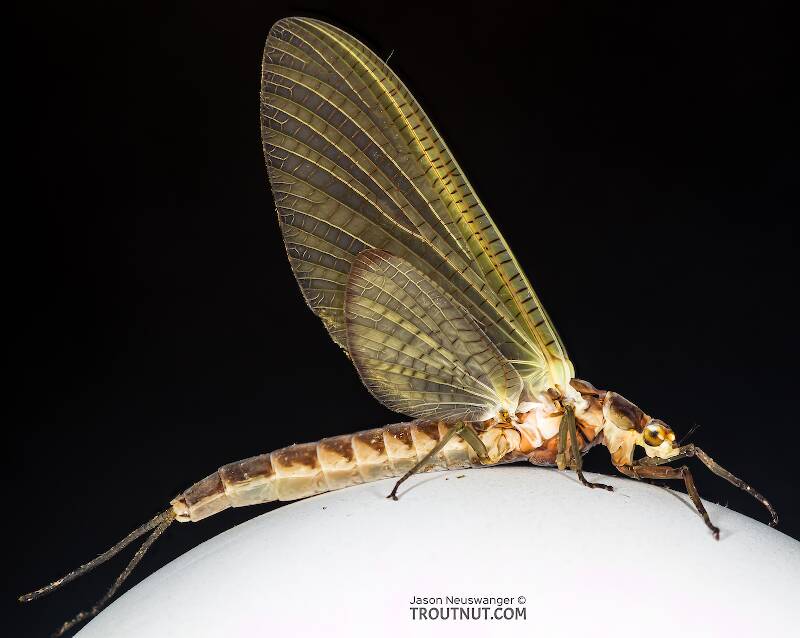
Hex Mayflies
Hexagenia limbata
The famous nocturnal Hex hatch of the Midwest (and a few other lucky locations) stirs to the surface mythically large brown trout that only touch streamers for the rest of the year.
Featured on the forum

With a bit of help from the microscope, this specimen keys clearly and unsurprisingly to Hydropsyche.

Troutnut is a project started in 2003 by salmonid ecologist Jason "Troutnut" Neuswanger to help anglers and
fly tyers unabashedly embrace the entomological side of the sport. Learn more about Troutnut or
support the project for an enhanced experience here.
GONZO on Jul 28, 2010July 28th, 2010, 9:47 am EDT
There are some very deep holes here, right Lloyd!?
Right--some of those holes hold treasure and some are filled with BS. The trick is to know which holes are which. :)
Just to keep the PA end up, I have to say that some of us "Pennsylvania Boys" can make our way around in the dark pretty well, despite what you've heard about Harvey's flashlight tactics or Louis's infamous glow-in-the-dark nuclear spinners.
I mention this mostly as an excuse to spin a Spence-like yarn, but also because a certain Midwestern fly-fisher-turned-fisheries-biologist can vouch for the essential facts of the story I am about to tell. He can also attest that intimate knowledge of local waters--or at least a good flashlight--is essential at night.
There's a rugged Lehigh River tributary where I used to regularly entertain myself by hiking out after fishing the evening hatch well into pitch darkness. The game was to do it without the assistance of artificial light. The first part of the route involved traversing along a small cliff face before working up and around a sizeable waterfall on another, smaller tributary. The remainder of the hike was mostly a matter of walking through the woods until coming to the place where the path crossed the smaller trib and then ascending a long grade on a steep, wooded hillside back to the road. After a few successful tries, I stopped carrying a flashlight when I fished this section of the stream. The walk in the dark became a ritual. It was silly and probably a bit foolhardy, but there was a strange satisfaction in accomplishing the act in the dark...kind of like a fly-fishing Ninja. I knew the ground so well that I could negotiate it by feel even on the blackest nights.
Several years ago, the aforementioned Midwesterner came for a visit. We planned to fish my favorite hatch, Drunella cornuta, on a storied stretch of a famous stream. It’s an early morning hatch, so I suggested that he might want to give the Lehigh trib a try in the evening, working upstream from a lower access path to the area of the waterfall. From there, the way out is not difficult to find--if you can see where you are going. My mistake, however, was that I had forgotten about the nearly universal tendency of fly fishers to become enthralled and lose track of time when exploring new waters.
At the time, I was staying at the home of a longtime fly-fishing friend who knew the stream as well as I did. When evening turned into night with no word from our Midwestern guest, my friend sounded the alarm. The conversation went something like this:
"Hey, does J---n have a flashlight?"
"I don't know. Why?"
"How the hell is he going to find his way out without one?"
"No problem...I walk out in the dark all the time."
"Yeah, but you know the way."
"Oh...I see what you mean. Good point."
Now, I began to worry. We considered mounting a search party, but I decided to try a phone call. Fortunately, our visitor had carried his cell phone on the stream. Sure enough, he had lingered too long fishing and had forgotten to bring a flashlight.
I attempted to describe the way out, but it quickly became clear that remotely guiding someone along the same route that I traveled so often and so smugly in the darkness wasn't going to be easy. The sound of the waterfall should get our wayward guest in the right neighborhood, but it was tricky from that point on. Our guest said that he might know where the waterfall was and that he would call back when he located it. While we waited for the next call, my friend and I discussed options. We decided that a search party was probably the best and safest plan.
The phone rang again, but this time the voice on the other end sounded somewhat frazzled and out of breath. The good news was that the waterfall had been located. And here is where I made my second mistake.
In a flash of unfortunate inspiration, I told our guest that the waterfall tributary led right back to the road where his car was parked. I knew that locating the path along the cliff band would be impossible, but if he could get above the falls, he should be able to follow the trib back to the road. I described the route around the falls as best I could, and our guest bravely decided to give it a try. He said he would call back when he was above the falls. (He would need both hands free to climb the rock face on the right-hand side of the falls.)
When I hung up, my friend gave me a grim look. He started to describe the ascent to the road along the little tributary that we both knew so well—a boulder-strewn, snag-filled upstream trek through a black hell of tangled rhododendron. He was right, but I also realized that the phone in his house was our only means of contact. If we embarked on a search before our guest called back, that connection would be lost. To make matters worse, my friend mentioned the black bears that frequent that area—bears notable as much for their size as their number. Great…thanks for the reminder! We waited for the next call.
When the call finally came, the voice sounded more frazzled, more out of breath, and our wayward guest was more lost. Somehow, on the climb around the falls, he had wandered away from the tributary and wasn’t sure where it was. I tried to think clearly. The trib should be somewhere on the left, provided that he hadn’t gotten too turned around. We stayed on the phone while I attempted to guide him through the darkness without really being sure of where he was. I reasoned that if he walked with the sound of the falls in his left ear he should stumble upon the trib again. That may have been the only sound reasoning I did up until that point because, after much thumping and bumping in the dark, the words “I found it” coincided with the sound of splashing water.
Now, the ugly prospect of a long, nasty slog up the trib presented itself. (I didn’t mention the bears, of course.) Fortunately, I remembered the stream crossing. It was not far above the falls, and it should be recognizable, even in the dark—it would be the only relatively flat, open spot between the top of the falls and the road. I described it and directed our guest to proceed upstream. On the phone, what followed was a long, agonizing period of splashing, crashing, crunching, and cursing. (Well, it sounded like cursing. It was muted in turn by the crackling of rhododendron branches and something that sounded suspiciously like kids holding a belly-flop competition at the community pool, so I can’t be sure.) Eventually, however, our guest announced that he had found the crossing. I directed him to the long uphill path on the left. From there it was just…well…a walk in the dark.
About a week ago, my friend and I were fishing the little waterfall trib upstream from the crossing to the road. As I waited for him to take his turn catching the bright little fish that hide in its tight little pockets, I tried to imagine this familiar place in the dark. I tried to imagine traveling up the little trib in the dark—traveling through the boulders, the moss, the downed trees, the claustrophobic rhododendron tunnel. What the hell, I knew better. Even in broad daylight, it was quite an accomplishment to fish that stretch without suffering a few nasty slips and falls.
Some fly fishers endure a lot for the sake of their sport. Some endure a lot for the sake of their fly-fishing friendships—even long-distance cyber- friendships. A word to the wise: If you happen to be visiting one of us “Pennsylvania Boys,” make sure you bring a flashlight. Trust me…you’re probably going to need it.
Oldredbarn on Jul 28, 2010July 28th, 2010, 10:42 am EDT
Great story Lloyd! Speaking again of BS...I've told my long suffering "please-for-me-don't-fish-after-dark-wife" that there are stretches of the mighty Au Sable I know so well I could wade blindfolded...For the record this may be true but I'd be a fool to give it a try! It's a hollow boast from an old-set-in-his-ways-angler who knows deep down inside she just gives a damn!
The Au Sable is relatively flat territory compared with the terrain you guys have...Now the swamps could prove a problem, but for the most part fishing after dark is not the same here as there....I guess I'm telling you what you already know...Carry a couple lamps or risk sleeping with the bears in the woods!
I have told here before the story about finding a couple guys on the South Branch one night around midnight who couldn't find their way out...Between them they had one light and only a weak idea of where they were at! Not a good post daylight fishing strategy.
Every so often we have lost someone up there. A few years back they found an old guy down below Wakeley Bridge with his waders full of water and he was too old and weak to lift himself up and save himself...One of my favorite angling writers Datus Proper was fishing with a friend in broad daylight on a stream that runs through his property and he had fished a million times and he slipped, bumped his head, and drown!
There is a ski trail that runs along the South Branch in the Mason Tract. It is close to a straight line, relatively speaking. The river is not a straight line. If someone unaware of where they were at trys to exit at one of the bends furthest from the path you have made a grave mistake. Especially after dark. When I was younger and still looking for the road less travelled I tried to "bust brush" through there during the day...Some of the trees were so close together it was impossible to get through...When I finally spotted the river, all sweaty and wore out, I was a happy camper and swore never to try it again!
If I were being honest I really should give it up or at least find an angling partner...That way at least someone may have a clue of where to find me.
Spence
The Au Sable is relatively flat territory compared with the terrain you guys have...Now the swamps could prove a problem, but for the most part fishing after dark is not the same here as there....I guess I'm telling you what you already know...Carry a couple lamps or risk sleeping with the bears in the woods!
I have told here before the story about finding a couple guys on the South Branch one night around midnight who couldn't find their way out...Between them they had one light and only a weak idea of where they were at! Not a good post daylight fishing strategy.
Every so often we have lost someone up there. A few years back they found an old guy down below Wakeley Bridge with his waders full of water and he was too old and weak to lift himself up and save himself...One of my favorite angling writers Datus Proper was fishing with a friend in broad daylight on a stream that runs through his property and he had fished a million times and he slipped, bumped his head, and drown!
There is a ski trail that runs along the South Branch in the Mason Tract. It is close to a straight line, relatively speaking. The river is not a straight line. If someone unaware of where they were at trys to exit at one of the bends furthest from the path you have made a grave mistake. Especially after dark. When I was younger and still looking for the road less travelled I tried to "bust brush" through there during the day...Some of the trees were so close together it was impossible to get through...When I finally spotted the river, all sweaty and wore out, I was a happy camper and swore never to try it again!
If I were being honest I really should give it up or at least find an angling partner...That way at least someone may have a clue of where to find me.
Spence
"Even when my best efforts fail it's a satisfying challenge, and that, after all, is the essence of fly fishing." -Chauncy Lively
"Envy not the man who lives beside the river, but the man the river flows through." Joseph T Heywood
"Envy not the man who lives beside the river, but the man the river flows through." Joseph T Heywood
Jmd123 on Jul 28, 2010July 28th, 2010, 3:53 pm EDT
Guys, I just DON'T EVER go out at night without a good flashlight. I might not turn it on until I'm heading for the car, but it's always with me. I also night fish stretches of river I know pretty well already through daylight recon. Just simple common sense...
Jonathon
Jonathon
No matter how big the one you just caught is, there's always a bigger one out there somewhere...
Motrout on Jul 29, 2010July 29th, 2010, 11:26 am EDT
Night fishing is a lot of fun. On the Current River in southern Missouri (probably the best trout stream I get to fish on a regular basis) you'll catch mostly 10-12" rainbows during the day. But come back a few hours before dawn, rig up a big, black woolly bugger, and fish till first light, and you may well catch a brown in the 5-7 pound range. I have found that no matter what fly I use, I always catch more browns than rainbows at night, even in streams that are dominated by rainbows.
As for the light I don't know. I try to keep light off the water- it isn't natural after all, but I wouldn't discount the light on the water idea... It's just not how I've fished.
As for the light I don't know. I try to keep light off the water- it isn't natural after all, but I wouldn't discount the light on the water idea... It's just not how I've fished.
"I don't know what fly fishing teaches us, but I think it's something we need to know."-John Gierach
http://fishingintheozarks.blogspot.com/
http://fishingintheozarks.blogspot.com/
Windknot79 on Jul 29, 2010July 29th, 2010, 1:07 pm EDT
well this topic has gone far.
I did fish the other night and I didn't get any fish in the dark.the pool and ripple I wanted to fish had 3 lay downs on it.Last week we got hit hard with some storms.
But before dark I did get 9 browns 9" to 13".One hour before dark and into the night there was a apple caddis hatch.I caught some of the little guys and brought them home live to identify on this site.I must say the wife wasn't to happy with the caddis.I have to say thanks to everyone on this site for info on all the bugs.This site has help me out a lot so far.
I also was the only person that night on the stream so I took out my flash lite and waited for a fish to rise.As soon as one came up I wait a sec and then put the lite on the fish in a sweeping motion.After waiting about 3to4 minutes I did it again and there was no fish. tried this two more times with the same results.so with this I will say keep your lites off the water.
I do have a question on the caddis.I took home four live caddis and one emerger that was stuck in the shuck.On the live caddis two of the abdomens were that green color and two were darker in color like a gray.These caddis are they malefemale or two different types,if they are mf which one would be the female?
thanks mike.
I did fish the other night and I didn't get any fish in the dark.the pool and ripple I wanted to fish had 3 lay downs on it.Last week we got hit hard with some storms.
But before dark I did get 9 browns 9" to 13".One hour before dark and into the night there was a apple caddis hatch.I caught some of the little guys and brought them home live to identify on this site.I must say the wife wasn't to happy with the caddis.I have to say thanks to everyone on this site for info on all the bugs.This site has help me out a lot so far.
I also was the only person that night on the stream so I took out my flash lite and waited for a fish to rise.As soon as one came up I wait a sec and then put the lite on the fish in a sweeping motion.After waiting about 3to4 minutes I did it again and there was no fish. tried this two more times with the same results.so with this I will say keep your lites off the water.
I do have a question on the caddis.I took home four live caddis and one emerger that was stuck in the shuck.On the live caddis two of the abdomens were that green color and two were darker in color like a gray.These caddis are they malefemale or two different types,if they are mf which one would be the female?
thanks mike.
Oldredbarn on Jul 30, 2010July 30th, 2010, 3:40 am EDT
Mike,
I know that Gonzo & Taxon are good, but I think the "Bug Boys" are going to need some cooridinants...Where the hell are you? Where did you find these caddis specimens? I promise I won't tell anyone where your "honeyhole" is, though it don't sound all that productive...Except for caddis of course.
Maybe I missed a location earlier in the post...
Spence
on a stream
I know that Gonzo & Taxon are good, but I think the "Bug Boys" are going to need some cooridinants...Where the hell are you? Where did you find these caddis specimens? I promise I won't tell anyone where your "honeyhole" is, though it don't sound all that productive...Except for caddis of course.
Maybe I missed a location earlier in the post...
Spence
"Even when my best efforts fail it's a satisfying challenge, and that, after all, is the essence of fly fishing." -Chauncy Lively
"Envy not the man who lives beside the river, but the man the river flows through." Joseph T Heywood
"Envy not the man who lives beside the river, but the man the river flows through." Joseph T Heywood
Oldredbarn on Jul 30, 2010July 30th, 2010, 3:50 am EDT
Sorry Michael...I found it...You are in New York somewhere...Sorry!
Mike maybe Softhackle can help you out with those southern NY Browns...He's down that way somewhere too...From what I hear he's been resting his home pool a bit and needs to get out more, but I don't think he's forgotten everything...Can you spell Leisenring??? :)
Spence
What color are the wings on your bugs??? Are they different on the different colored flies? Maybe grayish on the green one and tannish on the other? What hook size would you say they are...Those science boys work in millimeters so that could be difficult...You know with a little work I think we can turn you in to a nerd like the rest of us here...Data man, we need data!
The fish are all browns on a small stream in southern new york.thank u for any input mike.
Mike maybe Softhackle can help you out with those southern NY Browns...He's down that way somewhere too...From what I hear he's been resting his home pool a bit and needs to get out more, but I don't think he's forgotten everything...Can you spell Leisenring??? :)
Spence
What color are the wings on your bugs??? Are they different on the different colored flies? Maybe grayish on the green one and tannish on the other? What hook size would you say they are...Those science boys work in millimeters so that could be difficult...You know with a little work I think we can turn you in to a nerd like the rest of us here...Data man, we need data!
"Even when my best efforts fail it's a satisfying challenge, and that, after all, is the essence of fly fishing." -Chauncy Lively
"Envy not the man who lives beside the river, but the man the river flows through." Joseph T Heywood
"Envy not the man who lives beside the river, but the man the river flows through." Joseph T Heywood
Oldredbarn on Jul 30, 2010July 30th, 2010, 5:14 am EDT
Mike,
Ok, ok, ok!!! I can't stop myself this morning! It's Friday, I'm on my 2nd cup of tea, and I'm throwing a 75th b-day party for my mother tomorrow and I'm stressing...It may rain and I'll have nieces and nephews slobbering all over my sound system and poking themselves with my bodkin which I've told them a thousand times not to touch!
Blend yourself up a couple small things of dubbing to match the colors of the bodies of your bugs...Use you favorite dry fly hook 14 & 16's...
You will need thread to match the body color somewhat...Start just behind the eye an eye length or so back and wrap your thread back to just above the barb (when you do this I want you to hang enough thread off the back of the hook...like you would be making a dubbing loop)...Dub your caddis body shape forward leaving yourself some room for a wing and one wrap of hackle in front of wing...On the green version we will use grizzly hackle and tie this in where you stopped with the dubbing...On the other one lets use brown hackle...(the size of this feather should be equal to the hook gap or just a little beyond). Palmer your hackle back in even turns to the rear of the fly, catch the hackle with the tag-end of thread and bind it down here with a couple wraps..wind this tag-end back through the hackle to the front in nice even turns maybe 5 wraps or so, tie it down with your working thread and snip off excess...So far you have a version of Mr. Troth's Elk Hair Caddis, no?
(Yes you can used fine wire to tie the hackle down if you insist...gold for brown version silver for green one...(?)
Now...for the green one we will need a partridge feather with very nice even tips...You will use the gray mottled feather for the green version and the brown mottled feather for the one we used the brown hackle for...You will pinch it together a little, measure it to length (just past barely the end of the hook) and tie it down slanting back over the hackle (shiny side up/dull side down flat over the top)...Still looks like Elk Hair Caddis but we used Pat instead of elk or deer...If you were looking down from the front the wing feather should look like a "V" looking down from the top.
Now one wrap of hackle, just for show in front of wing to let everyone know you know how to "finish" your fly, a tad longer than the feather you palmered...Whip finish or whatever...
Take these down to your fishing hole and cast them over Herr von Braun's snout...See what he says...Give us a fishing report...These guys should work, if properly presented, during the day light hours, but katie-bar-the-door once the sun gets below the tree line until an hour or so after it sets...
I feel much better now, thanks! Catharsis is good for the soul like talking to your priest or whispering sweet nothings in your girlfriend's ear!
Spence
Ok, ok, ok!!! I can't stop myself this morning! It's Friday, I'm on my 2nd cup of tea, and I'm throwing a 75th b-day party for my mother tomorrow and I'm stressing...It may rain and I'll have nieces and nephews slobbering all over my sound system and poking themselves with my bodkin which I've told them a thousand times not to touch!
Blend yourself up a couple small things of dubbing to match the colors of the bodies of your bugs...Use you favorite dry fly hook 14 & 16's...
You will need thread to match the body color somewhat...Start just behind the eye an eye length or so back and wrap your thread back to just above the barb (when you do this I want you to hang enough thread off the back of the hook...like you would be making a dubbing loop)...Dub your caddis body shape forward leaving yourself some room for a wing and one wrap of hackle in front of wing...On the green version we will use grizzly hackle and tie this in where you stopped with the dubbing...On the other one lets use brown hackle...(the size of this feather should be equal to the hook gap or just a little beyond). Palmer your hackle back in even turns to the rear of the fly, catch the hackle with the tag-end of thread and bind it down here with a couple wraps..wind this tag-end back through the hackle to the front in nice even turns maybe 5 wraps or so, tie it down with your working thread and snip off excess...So far you have a version of Mr. Troth's Elk Hair Caddis, no?
(Yes you can used fine wire to tie the hackle down if you insist...gold for brown version silver for green one...(?)
Now...for the green one we will need a partridge feather with very nice even tips...You will use the gray mottled feather for the green version and the brown mottled feather for the one we used the brown hackle for...You will pinch it together a little, measure it to length (just past barely the end of the hook) and tie it down slanting back over the hackle (shiny side up/dull side down flat over the top)...Still looks like Elk Hair Caddis but we used Pat instead of elk or deer...If you were looking down from the front the wing feather should look like a "V" looking down from the top.
Now one wrap of hackle, just for show in front of wing to let everyone know you know how to "finish" your fly, a tad longer than the feather you palmered...Whip finish or whatever...
Take these down to your fishing hole and cast them over Herr von Braun's snout...See what he says...Give us a fishing report...These guys should work, if properly presented, during the day light hours, but katie-bar-the-door once the sun gets below the tree line until an hour or so after it sets...
I feel much better now, thanks! Catharsis is good for the soul like talking to your priest or whispering sweet nothings in your girlfriend's ear!
Spence
"Even when my best efforts fail it's a satisfying challenge, and that, after all, is the essence of fly fishing." -Chauncy Lively
"Envy not the man who lives beside the river, but the man the river flows through." Joseph T Heywood
"Envy not the man who lives beside the river, but the man the river flows through." Joseph T Heywood
Keystoner on Aug 15, 2010August 15th, 2010, 3:10 am EDT
I have had reasonably good success fishing in the very early morning while it is still dark. I typically use a BH wooly bugger in all black. More than once I've gotten a strike on the very first cast. Which is awesome.
"Out into the cool of the evening, strolls the Pretender. He knows that all his hopes and dreams, begin and end there." -JB
Quick Reply
Related Discussions
Topic
Replies
Last Reply
4
Jul 28, 2015
by Jmd123
by Jmd123
1
Feb 10, 2010
by Oldredbarn
by Oldredbarn
0
May 25, 2012
by Jmd123
by Jmd123
1
Nov 18, 2007
by Martinlf
by Martinlf
3
Nov 23, 2018
by Brian314
by Brian314

